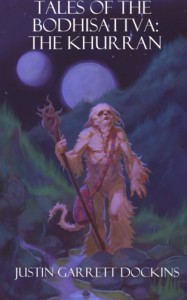tigertales
Tales of the Bodhisattva: the Khurann by Justin Dockins

Rating: did not finish
I think I have to admit that, for now at least, this is a dnf book.
The world building and the stylistic language are well done. I can tell this work is a labor of love, and that is to be commended. The story itself is about, in essence, a race of pacifist anthropomorphic sloth creatures. In particular, the narrative follows Kai, a young Khurran about to undertake his first vision quest. The only quibble I have with the execution is that this work is done in quite dreamy prose, which more than fits the subject, but also has the side effect of making it sound almost like a children's book at times.
I was cruising along enjoying myself, until the text informed me that the schism in the Khurran's society was along color lines. That is, all the 'black' Khurran left, disagreeing with the goddess Jesh. "A handful of those in the first group of Khurran were very different. As you know, all Khurran that live here on the mountain have hair ranging from brown to red. In the beginning, when there were very few of us, some Khurran had black hair. Most of the dark-haired ones left out tribe long ago, and there are none among us today."
That made me sad just to type out. Don't get it twisted, though, because I'm not at all saying that an author can't use skin (or in this case fur) color as a divider. But I am saying that an author shouldn't use it without thinking about the resonances therein, and I feel that there is a lack of thoughtfulness demonstrated here. The author surely realizes the real world echoes he's playing with, because the text then tells me, "the color of their hair, of course, was of no significance." No. No way. If there's no significance, then leave out the societal divide along color lines, and make it purely a ideological split.
I felt like this hand waving was almost insulting, as if I were meant to smirk and ignore the race issue for the rest of the book. Just acknowledging it with a nigh flippant comment isn't enough. And then, "It is said that the reason of their break from the tribe is that these individuals were violent and desired power over others."
So, the black Khurran are godless (they don't agree with the Khurran goddess), violent, and power mad. I hope I don't have to explain why this is unfortunate even though the Khurran are made up creatures. We bring our biases in to our writing no matter if we're writing about the real world or an alien society in a different place and time



